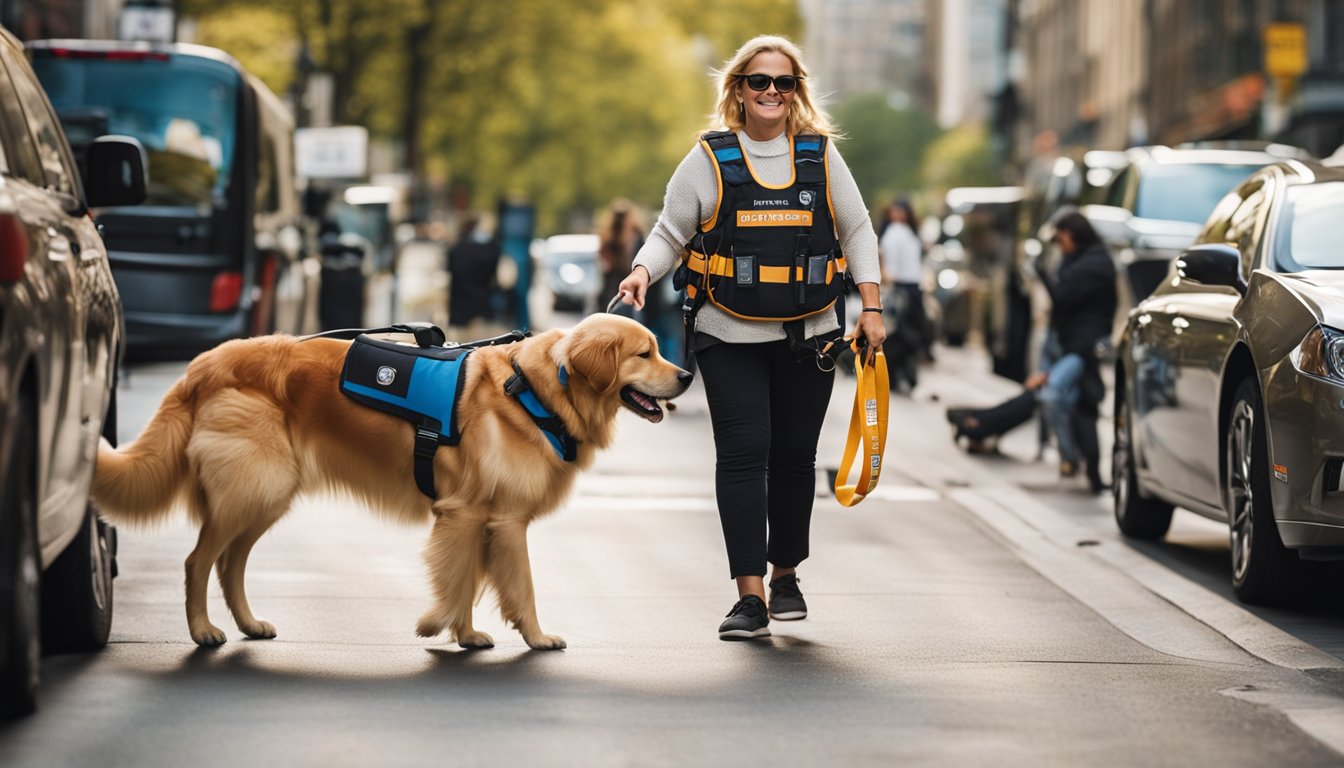Golden Retrievers are one of the most popular dog breeds in the world, known for their friendly and loyal personalities. But did you know that they are also commonly trained as service dogs? These intelligent and obedient animals can be trained to perform a wide range of tasks to assist people with disabilities, making them invaluable companions for those in need.
Understanding Golden Retrievers as Service Dogs can be a complex topic, as there are many different roles and responsibilities that these dogs can be trained for. Some of the most common tasks include mobility assistance, hearing and vision assistance, and emotional support. However, the training process for these dogs can be quite rigorous, and it can take many months or even years to fully train a Golden Retriever as a service dog.
Despite the challenges, having a Golden Retriever as a service dog can be an incredibly rewarding experience. These loyal animals can provide invaluable assistance to people with disabilities, allowing them to live more independent and fulfilling lives. However, it’s important to carefully consider the responsibilities and challenges of owning a service dog before making the commitment.
Key Takeaways
- Golden Retrievers are a popular breed for service dog training due to their intelligence and obedience.
- Service dogs can be trained to perform a wide range of tasks to assist people with disabilities, including mobility assistance, hearing and vision assistance, and emotional support.
- Owning a Golden Retriever service dog can be incredibly rewarding, but it’s important to carefully consider the responsibilities and challenges before making the commitment.
Understanding Golden Retrievers as Service Dogs
https://www.youtube.com/watch?v=3k6cA27iWy8&embed=true
If you’re considering getting a service dog, Golden Retrievers are one of the most popular breeds to choose from. They’re known for their friendly and easy-going temperament, making them a great fit for many people. In this section, we’ll take a closer look at Golden Retrievers as service dogs, including their history, breed characteristics, temperament, and intelligence.
History and Breed Characteristics
Golden Retrievers were originally bred in Scotland in the mid-19th century as hunting dogs. They were used to retrieve game birds, such as ducks and pheasants, from both land and water. Today, they’re still used as hunting dogs, but they’re also popular as family pets and service dogs.
Golden Retrievers are a medium to large breed, with males typically weighing between 65-75 pounds and females weighing 55-65 pounds. They have a thick, wavy coat that comes in shades of gold, and their ears are floppy. They’re known for their loving nature and are often referred to as “velcro dogs” because they like to be close to their owners.
Temperament and Intelligence
Golden Retrievers are known for their friendly and easy-going disposition, which makes them great service dogs. They’re also highly intelligent and trainable, which is another reason why they’re a popular choice for service work.
Golden Retrievers are known for their ability to connect with people on an emotional level. They’re often used as therapy dogs because of their gentle and loving nature. They’re also great with children and make excellent family pets.
In terms of intelligence, Golden Retrievers rank fourth out of 138 breeds according to Stanley Coren’s book “The Intelligence of Dogs.” They’re quick learners and respond well to positive reinforcement training methods.
Overall, Golden Retrievers make great service dogs because of their temperament and intelligence. They’re easy to train, loving, and have a natural desire to please their owners. If you’re looking for a service dog, a Golden Retriever might be the perfect fit for you.
Training Process for Golden Retrievers as Service Dogs
Golden Retrievers are highly trainable dogs that are well-suited to become service dogs. Training a Golden Retriever as a service dog is a rigorous process that requires patience, consistency, and dedication. In this section, we will discuss the training process for Golden Retrievers as service dogs.
Initial Training
The initial training for a Golden Retriever as a service dog involves basic obedience training. This includes teaching the dog to respond to basic commands such as sit, stay, come, and heel. The dog must also be socialized to different environments, sounds, and people. Socialization is important because it helps the dog become comfortable in different situations and reduces the risk of anxiety or fear.
Advanced Training
After the initial training, the dog is ready for advanced training. This involves teaching the dog specific tasks that will assist their owner. The tasks can vary depending on the owner’s needs, but they often include retrieving items, opening doors, turning lights on and off, and alerting their owner to specific sounds such as a doorbell or phone ringing. The dog must also learn to remain calm and focused in busy environments such as airports, malls, and restaurants.
Certification
Once the dog has completed their training, they must be certified as a service dog. Certification involves an evaluation to ensure that the dog is well-behaved and can perform the necessary tasks to assist their owner. The evaluation may include obedience training, specific task training, and public access training. The dog must also pass a health screening to ensure that they are healthy and up-to-date on their vaccinations.
Training a Golden Retriever as a service dog requires patience, consistency, and dedication. The dog must be trained to respond to specific commands and tasks, and they must also be socialized to different environments and people. Positive reinforcement is a key component of service dog training, as it helps the dog learn and retain new behaviors. With proper training and certification, a Golden Retriever can become a valuable service dog that can assist their owner with specific tasks and provide emotional support.
Roles and Responsibilities of Golden Retriever Service Dogs
https://www.youtube.com/watch?v=s3g823zgC90&embed=true
« Don’t Feed Your Golden Retrievers Store-Bought Food! Discover the Ultimate Homemade Meal Plan for Happy and Healthy Goldens
Lumps in Golden Retrievers: Understanding the Causes and Treatment Options »
Golden Retrievers are one of the most popular breeds of service dogs and are known for their intelligence, loyalty, and friendly temperament. They are highly trainable and can be trained to perform a wide range of tasks to assist people with disabilities. Here are some of the roles and responsibilities of Golden Retriever service dogs.

Guide Dogs
Golden Retrievers are commonly trained as guide dogs for the visually impaired. They are trained to guide their owners around obstacles and to stop at curbs and stairs. They are also trained to navigate through crowded areas such as airports and shopping malls.
Therapy Dogs
Golden Retrievers make excellent therapy dogs and are often used in hospitals, nursing homes, and schools. They are trained to provide emotional support and comfort to people who are going through difficult times. They are also trained to help people with autism and other developmental disabilities.
Mobility Assistance Dogs
Golden Retrievers can also be trained as mobility assistance dogs. They are trained to help people with mobility impairments by retrieving objects, opening doors, and providing stability and balance support. They can also be trained to pull wheelchairs and to help their owners get up from a seated position.
Psychiatric Service Dogs
Golden Retrievers can be trained as psychiatric service dogs to assist people with psychiatric disabilities such as depression, anxiety, and PTSD. They are trained to provide emotional support and to help their owners manage their symptoms. They can also be trained to interrupt self-harm behaviors and to provide deep pressure therapy.
Medical Alert Dogs
Golden Retrievers can be trained as medical alert dogs to assist people with medical conditions such as diabetes, epilepsy, and allergies. They are trained to detect changes in their owner’s body odor or behavior and to alert them to potential medical emergencies. They can also be trained to retrieve medication and to call for help in an emergency.
Overall, Golden Retrievers are highly versatile and can be trained to perform a wide range of tasks to assist people with disabilities. They are loyal, intelligent, and friendly, making them excellent service dogs. Whether you need a guide dog, therapy dog, mobility assistance dog, psychiatric service dog, or medical alert dog, a Golden Retriever can be trained to meet your specific needs.
Benefits and Challenges of Having a Golden Retriever as a Service Dog
https://www.youtube.com/watch?v=IWEcSDmqNaE&embed=true
Benefits
Golden Retrievers are one of the most popular breeds for service dogs, and for good reason. They possess a number of qualities that make them ideal for this role. Here are some of the benefits of having a Golden Retriever as a service dog:
-
Intelligence: Golden Retrievers are highly intelligent and can be trained to perform a wide range of tasks, from retrieving dropped items to opening doors and turning on lights. This intelligence also makes them excellent problem-solvers, which can be helpful in a variety of situations.
-
Gentleness: Golden Retrievers are known for their gentle nature, which makes them well-suited to working with people who have disabilities or who are experiencing anxiety, stress, or depression. They are also very patient, which is important when working with individuals who may need extra time or assistance.
-
Loyalty: Golden Retrievers are incredibly loyal to their owners, which can be comforting for individuals who may feel isolated or alone due to their disability or condition. This loyalty can also help to build trust between the service dog and the person they are working with.
-
Independence: Having a service dog can help individuals with disabilities to become more independent, as the dog can assist with tasks that might otherwise require the help of another person. This can increase their sense of self-worth and improve their quality of life.
Potential Challenges
While there are many benefits to having a Golden Retriever as a service dog, there are also some potential challenges to consider. Here are a few things to keep in mind:
-
Training: While Golden Retrievers are highly trainable, it still takes a significant amount of time and effort to train them to be effective service dogs. This can be a challenge for individuals who are already dealing with a disability or condition.
-
Cost: Service dogs can be expensive, with costs ranging from several thousand dollars to tens of thousands of dollars. This can be a barrier for individuals who may not have the financial resources to cover these costs.
-
Public Perception: Unfortunately, not everyone understands the role of service dogs and may question why someone has a dog with them in public. This can be stressful and uncomfortable for both the service dog and the person they are working with.
-
Responsibility: Owning a service dog is a significant responsibility, as they require regular training, exercise, and veterinary care. This can be challenging for individuals who are already dealing with a disability or condition.
In conclusion, while there are some potential challenges to having a Golden Retriever as a service dog, the benefits can far outweigh them. These dogs can provide invaluable support, assistance, and companionship to individuals with disabilities or conditions, improving their quality of life and overall happiness.

Choosing and Caring for Your Golden Retriever Service Dog
https://www.youtube.com/watch?v=yaXSUiMLAn8&embed=true
Choosing the Right Dog
Choosing the right golden retriever to train as a service dog is a crucial step. You may want to consider getting a puppy from a reputable breeder who specializes in breeding service dogs. Look for breeders who prioritize socialization and temperament testing to ensure that the puppies are suitable for service work. It’s important to communicate your needs and requirements to the breeder so that they can help you choose the right puppy.
When choosing a golden retriever, look for a dog that is friendly, outgoing, and eager to please. These traits are essential for a service dog as they need to be comfortable in different environments and able to communicate with their handler effectively.
Daily Care and Maintenance
Taking care of your golden retriever service dog is essential to ensure that they are healthy and happy. Regular grooming is important to keep their coat clean and free of tangles. Brush their coat at least once a week and bathe them every few months. You can also take your dog to a professional groomer for a trim and nail clipping.
Daily exercise is also important for your golden retriever service dog. Take them for walks and play with them to keep them active and engaged. Provide them with toys and treats to keep them entertained and mentally stimulated.

Essential Gear
Your golden retriever service dog will need a few essential pieces of gear, including a vest, leash, and identification tags. A vest will help identify your dog as a service animal and make it easier to communicate with others in public. A leash will help keep your dog under control and prevent them from wandering off. Identification tags are essential in case your dog gets lost or separated from you.
In conclusion, choosing and caring for your golden retriever service dog requires careful consideration and attention to detail. With the right training, care, and gear, your golden retriever can be a loyal and effective service dog.
Frequently Asked Questions
https://www.youtube.com/watch?v=tGChqLz9ivs&embed=true
What types of service dogs are there?
Service dogs are trained to perform specific tasks to assist individuals with disabilities. There are various types of service dogs, including guide dogs for the blind, hearing dogs for the deaf, mobility assistance dogs for those with physical disabilities, and psychiatric service dogs for those with mental health conditions.
Which breeds make the best service dogs?
While any breed can become a service dog, some breeds are more commonly used due to their temperament, intelligence, and trainability. Golden Retrievers and Labrador Retrievers are among the most popular breeds for service work due to their friendly and trainable nature.

How can I train a Golden Retriever to be a service dog?
Training a Golden Retriever to be a service dog requires patience, consistency, and dedication. It is recommended to work with a professional trainer who has experience in training service dogs. Positive reinforcement techniques, such as treats and toys, are often used in training.
What is the difference between a service dog and a therapy dog?
Service dogs are trained to perform specific tasks to assist individuals with disabilities, while therapy dogs provide emotional support and comfort to individuals in hospitals, nursing homes, and other settings. Therapy dogs do not have the same legal protections as service dogs and are not granted access to public places.
Can Golden Retrievers be trained as psychiatric service dogs?
Yes, Golden Retrievers can be trained as psychiatric service dogs. They can be trained to perform a variety of tasks to assist individuals with mental health conditions, such as providing deep pressure therapy, interrupting self-harm behaviors, and alerting to panic attacks.
What tasks can Golden Retrievers perform as service dogs?
Golden Retrievers can be trained to perform a variety of tasks as service dogs, including retrieving items, opening and closing doors, turning on and off lights, providing balance and stability, and alerting to sounds or medical emergencies. The tasks a service dog is trained to perform depend on the individual’s specific needs and disabilities.










